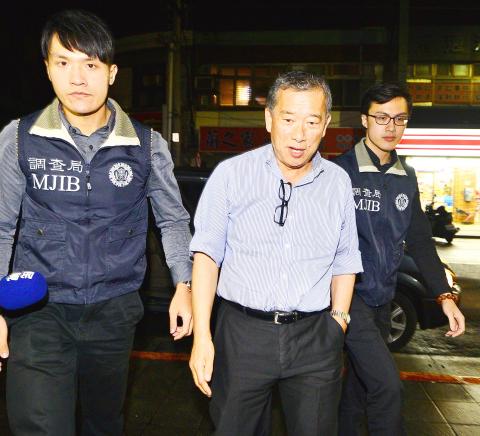OBI Pharma Inc (台灣浩鼎) chairman Michael Chang (張念慈) was yesterday morning released after posting NT$1 million (US$30,914) bail, as prosecutors listed him as a defendant on insider trading charges.
Chang and four other OBI Pharma executives were summoned for questioning at the Shilin District Prosecutors’ Office in Taipei on Friday, after judicial investigators searched the company headquarters and its laboratories to gather evidence earlier that day.
Prosecutors said they had made breakthroughs in the investigation and therefore questioned the other four company executives, including OBI Pharma general manager Huang Hsiu-mei (黃秀美), head of research and development Yu Cheng-te (游丞德), administration division manager Liao Tsung-chih (廖宗智) and finance division manager Chang Sui-fen (張穗芬), to gather information related to the case.

Photo: Wang Yi-sung, Taipei Times
Prosecutors said there is sufficient evidence of their involvement in insider trading to list them as defendants in the case, but they were released without bail yesterday.
OBI Pharma yesterday issued a statement, saying the company did not engage in any illegal activities, and asked the justice agencies to conduct a fair and unbiased investigation to clear the company of the charges.
The statement criticized the search process, with judicial investigators confiscating private documents and material containing proprietary business information, some of which relates to the company’s core technology development, including results of more than 10 years of research, which it said would adversely affect the rights of company shareholders if leaked and deal a severe blow to the nation’s pharmaceutical, healthcare and bioscience industries.
Academia Sinica President Wong Chi-huey (翁啟惠), a prominent Taiwanese-American biochemist and research scientist, has also been embroiled in the affair.
He returned to Taiwan from the US on Friday and met with President Ma Ying-jeou (馬英九) to discuss the case; he again apologized to the public for the controversy, saying he was not involved in insider trading and had no intention of manipulating OBI Pharma shares, some of which were held in his daughter’s name.
While he was in the US, Wong tendered his resignation on March 31, but Ma rejected it.
In related news, Academia Sinica yesterday settled on three candidates for its next president, with the list to be forwarded to the Presidential Office for selection, Academia Sinica Vice President Wang Fan-sen (王汎森) said.
Additional reporting by Wu Po-wei

SECURITY: As China is ‘reshaping’ Hong Kong’s population, Taiwan must raise the eligibility threshold for applications from Hong Kongers, Chiu Chui-cheng said When Hong Kong and Macau citizens apply for residency in Taiwan, it would be under a new category that includes a “national security observation period,” Mainland Affairs Council (MAC) Minister Chiu Chui-cheng (邱垂正) said yesterday. President William Lai (賴清德) on March 13 announced 17 strategies to counter China’s aggression toward Taiwan, including incorporating national security considerations into the review process for residency applications from Hong Kong and Macau citizens. The situation in Hong Kong is constantly changing, Chiu said to media yesterday on the sidelines of the Taipei Technology Run hosted by the Taipei Neihu Technology Park Development Association. With

A US Marine Corps regiment equipped with Naval Strike Missiles (NSM) is set to participate in the upcoming Balikatan 25 exercise in the Luzon Strait, marking the system’s first-ever deployment in the Philippines. US and Philippine officials have separately confirmed that the Navy Marine Expeditionary Ship Interdiction System (NMESIS) — the mobile launch platform for the Naval Strike Missile — would take part in the joint exercise. The missiles are being deployed to “a strategic first island chain chokepoint” in the waters between Taiwan proper and the Philippines, US-based Naval News reported. “The Luzon Strait and Bashi Channel represent a critical access

CARROT AND STICK: While unrelenting in its military threats, China attracted nearly 40,000 Taiwanese to over 400 business events last year Nearly 40,000 Taiwanese last year joined industry events in China, such as conferences and trade fairs, supported by the Chinese government, a study showed yesterday, as Beijing ramps up a charm offensive toward Taipei alongside military pressure. China has long taken a carrot-and-stick approach to Taiwan, threatening it with the prospect of military action while reaching out to those it believes are amenable to Beijing’s point of view. Taiwanese security officials are wary of what they see as Beijing’s influence campaigns to sway public opinion after Taipei and Beijing gradually resumed travel links halted by the COVID-19 pandemic, but the scale of

Pope Francis is be laid to rest on Saturday after lying in state for three days in St Peter’s Basilica, where the faithful are expected to flock to pay their respects to history’s first Latin American pontiff. The cardinals met yesterday in the Vatican’s synod hall to chart the next steps before a conclave begins to choose Francis’ successor, as condolences poured in from around the world. According to current norms, the conclave must begin between May 5 and 10. The cardinals set the funeral for Saturday at 10am in St Peter’s Square, to be celebrated by the dean of the College